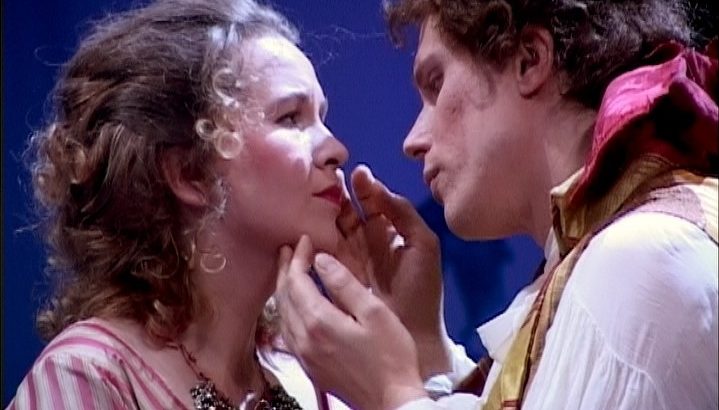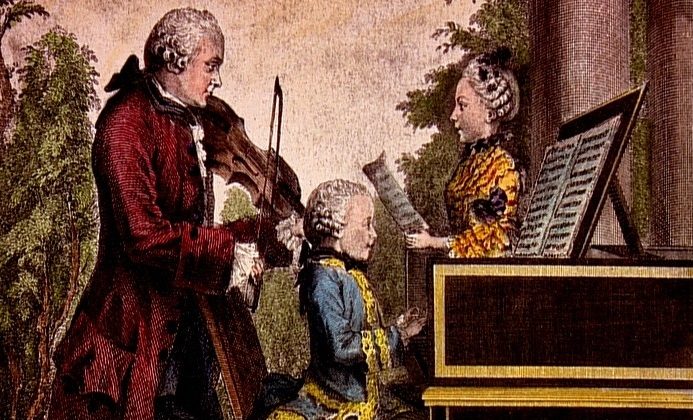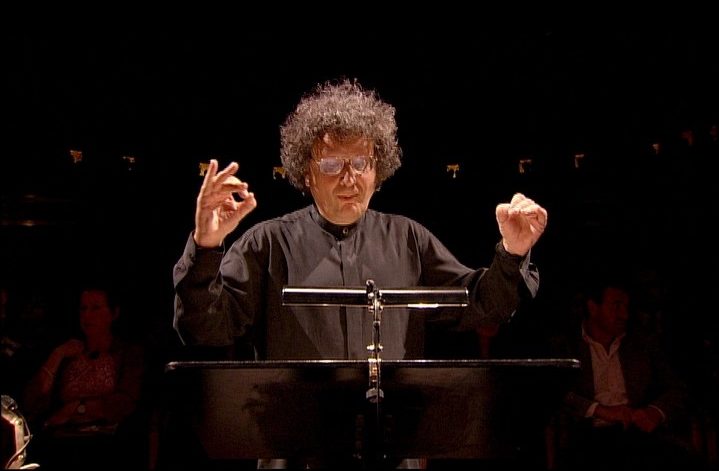In Search of Mozart, Mon Jan 27th
Feature-length, comprehensive film on “that God of music”.
“In Search of Mozart”, is one of a series of wonderful films on some of the world’s greatest composers of opera and classical music. It’s a superb series, bringing us to the heart of the work of these great geniuses of Western music. In December SGC screened the Beethoven offering in the series – it was so detailed, analytical and informative that our well-known afficionado of all things relating to the World of the Arts, Joe Power, stated: “I learned more from “I Search of Beethoven” than I learned from all the books I’ve ever read about the great man” – high praise indeed, coming from Joe. This film had the participation of seventy-plus renowned musicologists, experts, directors and performers who bring the experiences of many lifetimes to bear on their comments and analyses of the “little genius from Salzburg”. They will throw some further light on the Mozart that was presented to the world in that gorgeous film of Peter Schaffer’s play “Amadeus”.  I must ‘put my cards on the table’ regarding Mozart – he is my ‘God of music’, a source of endless delight at the beauty of his creations. I can call up compelling voices to support me. Neville Cardus, the English writer on music and cricket, once wrote:- “Mozart is safe with those who have illumined and transfigured existence here below. That a Mozart was once born is a consummation which beggars understanding and all known science, all psychology, all physics, all metaphysics and all known cosmogony whatever”. Of the composer’s Mass in C Minor, he wrote:- “It’s astonishing that any human being should have written music for the angels”. When Chopin (1810 – 1849) lay dying a friend assured him that on his death his music would be played in his memory.” “No”, Chopin replied, “When I die play Mozart in memory of me. I shall hear you!”. Charles Gounod (1818- 1893), the composer of the opera, “ Faust”, wrote of a piece of music by Mozart:- “It’s perfect, just like every piece of music composed by Mozart, that God of music”. Franz Schubert (1797 – 1828), himself among the great composers, stated:- “The magical tones of Mozart’s music resound in my senses. How indescribably powerful and yet so gentle. These beautiful imprints, untouched by time and circumstances, exert a beneficial influence on our lives.
I must ‘put my cards on the table’ regarding Mozart – he is my ‘God of music’, a source of endless delight at the beauty of his creations. I can call up compelling voices to support me. Neville Cardus, the English writer on music and cricket, once wrote:- “Mozart is safe with those who have illumined and transfigured existence here below. That a Mozart was once born is a consummation which beggars understanding and all known science, all psychology, all physics, all metaphysics and all known cosmogony whatever”. Of the composer’s Mass in C Minor, he wrote:- “It’s astonishing that any human being should have written music for the angels”. When Chopin (1810 – 1849) lay dying a friend assured him that on his death his music would be played in his memory.” “No”, Chopin replied, “When I die play Mozart in memory of me. I shall hear you!”. Charles Gounod (1818- 1893), the composer of the opera, “ Faust”, wrote of a piece of music by Mozart:- “It’s perfect, just like every piece of music composed by Mozart, that God of music”. Franz Schubert (1797 – 1828), himself among the great composers, stated:- “The magical tones of Mozart’s music resound in my senses. How indescribably powerful and yet so gentle. These beautiful imprints, untouched by time and circumstances, exert a beneficial influence on our lives. Oh, Mozart, Immortal Mozart!” Of the slow movement of Mozart’s Third Violin Concerto, the musicologist, Alfred (not Albert!) Einstein, wrote:- “This is music that seems to have fallen straight from heaven”. And the slow movement of the Clarinet Quintet he described as “Sublime, with a celestial radiance and stillness”. Josef Haydn (1732 – 1809), Mozart’s great older contemporary, the ‘father of the symphony’, once discouraged a production of one of his own operas, saying:- “I should be risking a great deal for scarcely any man can brook comparison with the great Mozart”. At that time the most famous living composer in Europe, he went even further:- Where Mozart is Haydn cannot show himself”. When Johann Hasse (1699 – 1783), who had established European-wide fame as an opera composer even before Mozart was born, attended a concert of the young fifteen-year-old composer’s music, he wrote: “This boy will confine us all to oblivion”.
Oh, Mozart, Immortal Mozart!” Of the slow movement of Mozart’s Third Violin Concerto, the musicologist, Alfred (not Albert!) Einstein, wrote:- “This is music that seems to have fallen straight from heaven”. And the slow movement of the Clarinet Quintet he described as “Sublime, with a celestial radiance and stillness”. Josef Haydn (1732 – 1809), Mozart’s great older contemporary, the ‘father of the symphony’, once discouraged a production of one of his own operas, saying:- “I should be risking a great deal for scarcely any man can brook comparison with the great Mozart”. At that time the most famous living composer in Europe, he went even further:- Where Mozart is Haydn cannot show himself”. When Johann Hasse (1699 – 1783), who had established European-wide fame as an opera composer even before Mozart was born, attended a concert of the young fifteen-year-old composer’s music, he wrote: “This boy will confine us all to oblivion”. Beethoven (1770 – 1827), who had met Mozart, wrote:- “I have always counted myself among the greatest admirers of Mozart and shall remain so till my last breath”. Richard Wagner (1813 – 1883), never known for acknowledging any genius other than his own, said: “Mozart’s great genius raised him above all masters of art in every country”. The novelist,Virginia Woolf told of attending a performance of Mozart’s opera, “The Marriage of Figaro” at the Old Vic in London: “It’s perfectly lovely, breaking from one beauty into another, the perfection of music and the vindication of opera”. Hector Berlioz (1803 – 1869), whose operas contain music of surpassing beauty, was unequivocal:- “The marvellous beauty of Mozart’s Quartets and Quintets and Sonatas first converted me to this celestial genius, whom thenceforth I worshipped”. Jonathan Miller, Renee Fleming and the late Stanley Sadie (one of the great authorities on Mozart) are just three of those who know their Mozart who are cited in this film. If you care about Mozart, even if you care about music, don’t miss “In Search of Mozart”.
Beethoven (1770 – 1827), who had met Mozart, wrote:- “I have always counted myself among the greatest admirers of Mozart and shall remain so till my last breath”. Richard Wagner (1813 – 1883), never known for acknowledging any genius other than his own, said: “Mozart’s great genius raised him above all masters of art in every country”. The novelist,Virginia Woolf told of attending a performance of Mozart’s opera, “The Marriage of Figaro” at the Old Vic in London: “It’s perfectly lovely, breaking from one beauty into another, the perfection of music and the vindication of opera”. Hector Berlioz (1803 – 1869), whose operas contain music of surpassing beauty, was unequivocal:- “The marvellous beauty of Mozart’s Quartets and Quintets and Sonatas first converted me to this celestial genius, whom thenceforth I worshipped”. Jonathan Miller, Renee Fleming and the late Stanley Sadie (one of the great authorities on Mozart) are just three of those who know their Mozart who are cited in this film. If you care about Mozart, even if you care about music, don’t miss “In Search of Mozart”.
Jim Ryan